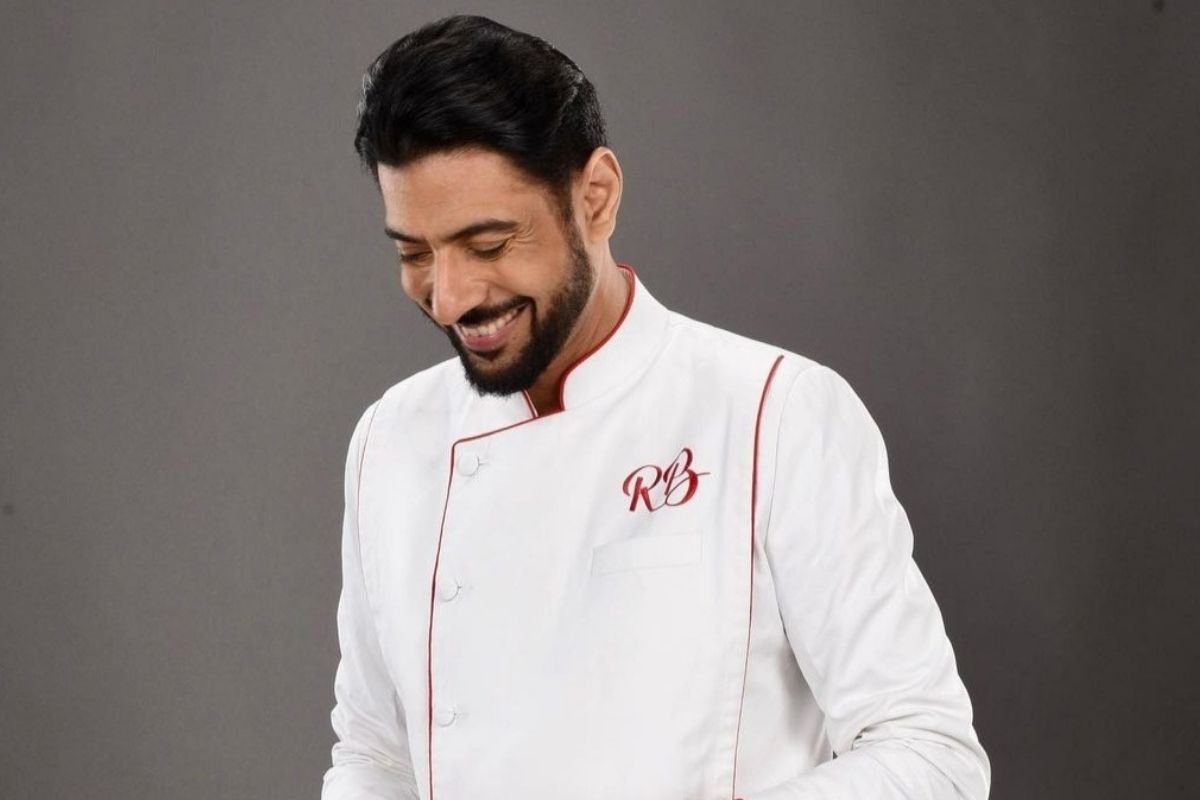Chef Ranveer Brar is one of the most celebrated chefs in India and is also a name counted among the world-renowned culinarians. An alumnus of the Institute of Hotel Management, Lucknow, Ranveer has a passion for cooking and flavours. His journey started from becoming the youngest Executive Chef at a renowned five-star hotel to a personality who has hosted exemplary food shows like ‘Himalayas – The Offbeat Adventure‘, ‘Raja Rasoi Aur Andaaz Anokha‘, ‘MasterChef India‘, and ‘The Great Indian Rasoi‘. He has been one of those chefs with whom every generation connects because of his exquisite recipes, his speciality in making the nafazati (Delicate) Galauti Kebabs, and his efforts in making Indian cuisine known to the world.
This time you cannot say, “Ranveer, aapne bataya nahi” (Ranveer, you did not tell this) because, in a candid interview with Brown, Ranveer talks about his early life, memorable days, food techniques, and recipes.
You hail from The City of Nawabs – Lucknow. Tell us about your background.
Most of my upbringing happened in Lucknow. The best part about Lucknow is that it not only lives as a city but also lives in small pockets of neighbourhoods or mohallas blended with everyday nuances. So the advantage of growing up in Lucknow is that you get exposed to those mohallas and delicate refinements. This has helped me in growing and developing flavours.

When did you first think about becoming a chef?
I would say that it was not a single incident that I can attribute to. It was a step-by-step process. As I was growing up in a city where I would see people going crazy about food, the thought of becoming a chef developed gradually. This development made me realize that I could do this for my entire life, and that’s how I became a chef.
“A chef works for an average of fourteen hours a day in their career. When I say on an average, there are days with eighteen or twenty hours working days as well where people are chilling and partying and enjoying your food.“
Says Chef Ranveer
Do the countries that you visit influence you to develop new recipes or resurrect the lost recipes of that place?
My cooking over the years has to do more with our country – the Indian cuisine, native traditions, methods of cooking, and our culturally rich recipes. But one such country that inspires me or whose cuisine galvanizes my love for flavours is Italy.
You became the youngest executive chef at a leading five-star hotel. Please share your experience from thereon.
I would say I was lucky that I got a chance to get mentored by the finest people in the industry who believed in my potential. The average age of an executive chef is between the late thirties and early forties. However, my mentors had faith in my capabilities and gave me this opportunity at the early age of twenty-five. The staff I was working with, on average, was 1.5 years older than me, but this turned out to be a boon. Being a hotel chef exposes you to various cultures, thoughts, techniques, and cuisines as the people working there come from different backgrounds and parts of the city or various countries. It tells you what food means across the various strata of society, which helped me a lot in my career.
You have won various prestigious awards like ‘Indian Of The Year’ in 2017, received recognition from the ‘American Institute of Wine and Food‘, and were featured in the book named ‘Celebrated Chefs of India’ by Marryam H Reshii. Tell us about the hard work that has gone behind winning these awards and recognitions. Is there still any prestigious award that you are looking forward to?
I would say it is not just me. I have put the same amount of hard work as anybody else would put into it. A chef works for an average of fourteen hours a day in their career. When I say on an average, there are days with eighteen or twenty hours working days as well where people are chilling and partying and enjoying your food. For any chef, the initial days are really exciting with challenges and ideas, but like any other industry, we too work hard, and that is why our job is challenging as well.
You have written the books ‘Come into my Kitchen’ and ‘A Traditional Twist’. Please tell us about these books and the idea that inspired you to pen them down.
Come Into My Kitchen is my first book and can be identified as a culinary autobiography where I have majorly talked about my hometown, roots, ideas, and thoughts about food, recipes I love to cook, and some reflections on my life.
A Traditional Twist is a book where I have talked about how we can make Indian food healthier. Although, I feel if we’re talking about eating healthy in Indian cuisine, we should eat the same food but in lesser quantity. However, for all the fitness enthusiasts who want to stay fit without giving up on Indian food and flavour, I have tried to present the same Indian dishes with a healthier yet traditional twist.
You have also done several television shows like ‘The Great Indian Rasoi, Season 1’, ‘MasterChef India’, ‘Raja Rasoi Aur Andaaz Anokha’, hosted a landmark show on Living Foodz, ‘Himalayas, the Offbeat Adventure’ and a lot more. Is there any specific show close to your heart? How was your journey while being a part of these shows?
Well, it is difficult to choose between The Great Indian Rasoi and Raja Rasoi Aur Andaaz Anoka. The Great Indian Rasoi is special to me as it was my first travel show where I went around the country and tasted different Indian cuisines and exotic recipes. However, Raja Rasoi Aur Andaaz Anokha gave me the opportunity to discover myself as a cook. I made friends with some great people on the show.
All these shows have their own place in my heart, but these two are special to me.
There is a saying that all Biryanis aspire to be Lucknowi Biryani. But this sometimes puts off the Hyderabadi Biryani lovers. Please enlighten us about these various flavours of Biryanis and what makes each of them unique?
To give Lucknowi biryani a status equivalent to biryanis would be a bit unfair because it is more of a pulao (special rice cooked with assorted herbs and nuts). When we talk about Hyderabadi biryani, it is more inclined towards the realness and rawness of flavours. They do not shy away from the spices. Talk of the Lucknowi Biryani; it is about baroque or finesse and delicacy. The Delhi Biryani can be said to be the precursor of Lucknowi Biryani with a much more Mughaliya influence.
But I totally agree with you that all Biryanis aspire to attain the refinement and richness of Lucknowi Biryani, but I also believe that every Biryani brings something unique with it to the table.
Why are curries so popular in the Asian Pacific regions like Indonesia, Thailand, and India?
The word curry itself is very British in terms of its origin. We do not use the word curry. We have proper dishes with gravies. It is majorly because we are rice-eaters and rice-eating nations need something to go with rice. That is why countries like Malaysia, Indonesia, Thailand, or India have gravy dishes. But to club them all under curries, I feel, will require an analytical approach.

Tell us about that one recipe or cooking technique that people often ask you?
Dhungar or cold smoking technique is what people are often curious about and ask about the procedure. They are fascinated by the technique of infusing a smoky flavour in Galauti Kebabs or other recipes.
What difference do you find between the flavours and culinary techniques of the West and the Asian continent?
So, Asian cooking involves mostly techniques like braising and slow cooking. However, the culture of restaurants and formal chefs started very early in the West. So we can say that our cuisine is both developing and refining while refinement started early in the West. It can also be noted that the West and the East differ very much in terms of spices as well.
But then, we cannot club the cuisines as Eastern or Asian because, within the West, the Italian, Portuguese, British, or Scandinavian cuisines are altogether different and unique.
“The propagation of Indian cuisine is our responsibility, and we should do it with pride.“
Says Chef Ranveer
How have the Western and the Eastern cuisines influenced each other?
We can say that both the West and the East have intertwined among themselves because of factors like colonization and export of tropical produce from the European colonies in the Philippines, Myanmar, and India for the West. A lot of flavours and spices travelled Westwards from the East, while from the West, food habits like eating on a plate, pre-portioning, or table etiquettes were influenced in the East.

Also, we should note here that since the European countries had colonies in the Americas and Africa, a lot of products like spices and vegetables from the new world (America) travelled Eastwards via the old world (Europe). Although colonization was not a good thing that happened, we cannot disregard the fact that this whole channel of products getting imported to the Eastern World from the New World via the Old World would not have happened or might have taken much longer.
Lastly, any piece of advice for our readers?
My message to the readers is that wherever you are, you should promote your food and cuisine. The propagation of Indian cuisine is our responsibility, and we should do it with pride. It is our duty to become ambassadors of the food that we have eaten while growing up, and we should make its flavour known to the world by feeding it to the people around us.
Chef Ranveer is not only a chef but a personality who inspires the young generation to pursue their dreams and feel proud of their Indian cultures and values. Through his YouTube channel and Instagram page, Chef Ranveer tries his best to remain connected with his fans and audience. He is indeed a down-to-earth people’s chef. So go ahead and tell us in the comments section which recipe of Chef Ranveer’s have you tried?






26 Comments
Randheer Singh
July 15, 2021 at 4:49 am
What a delicious interaction 😋😍😊
Dhiman Kushary
July 15, 2021 at 4:50 am
Nice interaction.
Dr.Prerna
July 15, 2021 at 7:15 pm
I also love this chef and his love towards Lucknow.Being a Lucknowite feels good to see his success and you have captured in it well.
Ranjana Jaiswal
July 16, 2021 at 1:08 pm
The way to a man’s heart is through his stomach and dis celebrity is n exception…making the way direct into a women’s 💕.fabulously written
Alka
July 16, 2021 at 1:01 am
Nice discussion
Madhurima Roy
July 15, 2021 at 4:49 am
Loved this article , His show the great Indian rasoi has always inspired me to try and cook new recipes!!
Amit Jaiswal
July 15, 2021 at 3:22 pm
Excellent writeup….
Dr.Prerna
July 15, 2021 at 7:17 pm
I love this chef and his love towards Lucknow and it’s food.And the interview is well captured.
Kushagr
July 15, 2021 at 4:49 am
Pretty epic.
Prerna Kundani
July 15, 2021 at 4:55 am
Awesome work dear… keep up the good work and keep going 🥰🥰
Rekha Tripathi
July 15, 2021 at 5:16 am
Saumya aapne bataya nahi aap itna achha interview leti hain
Vansh Ahluwalia
July 15, 2021 at 7:33 am
Damn, this interview is so interesting. I was hooked to it. Superb work Saumya!
Benazir Fatima
July 15, 2021 at 8:13 am
Great work…. Keep it up
Shruti
July 16, 2021 at 3:54 pm
Always been a big fan of chef Ranveer Brar…..great interview Saumya! An interesting interview of Luckhnavi chef by a Lucknowite. Big thumbs up 👍.
Meenakshi Mishra
July 15, 2021 at 8:14 am
Excellent interview Saumya. The kind of questions you have asked reflect the amount of homework you have put in the research.
Way to go dear!!!!
Apoorva
July 15, 2021 at 8:38 am
Well….his name drew me here, I’m a huge fan of his non veg recipes and yes the way he interacts with the audience,is something really entertaining
Well written article
Rashmi Singh
July 15, 2021 at 8:41 am
A Very sumptuous and delicious interview.
Safiya Khanam
July 15, 2021 at 9:10 am
It was always such a privilege listening to him in his shows and this article takes it a step further. Great work Saumya!❤️
Rupali Sircar
July 16, 2021 at 12:41 pm
Cool Saumya
A handsome chef, indeed
A beautiful girl in interaction with a handsome chef.😜
Jokes apart.
Keep going…
Kirti PANT
July 15, 2021 at 1:40 pm
Very informative and useful contents for the gourmets…all information put together specially..
Jaishree
July 16, 2021 at 7:08 am
have always been his big fan! This is indeed an amazing piece saumya!
Neha S.Nair
July 16, 2021 at 7:46 am
Loved it!! Great work Saumya!
R. K. Jaiswal
July 16, 2021 at 8:24 am
Great work saumya. Loved it❤keep going.
Deepa Tandon
July 16, 2021 at 2:58 pm
Excellent work…Keep it up Saumya
Shruti
July 16, 2021 at 4:02 pm
A big fan of chef Ranveer Brar….great work Saumya. The interview was scrumptious😋. A lovely interview of a true Luckhnavi Chef by a Luckowite.
Stay blessed my dear.
Sharda Jaiswal
July 18, 2021 at 8:19 am
Very fruitful effort. Blessing you with loads of luck and strength to fulfill your dreams